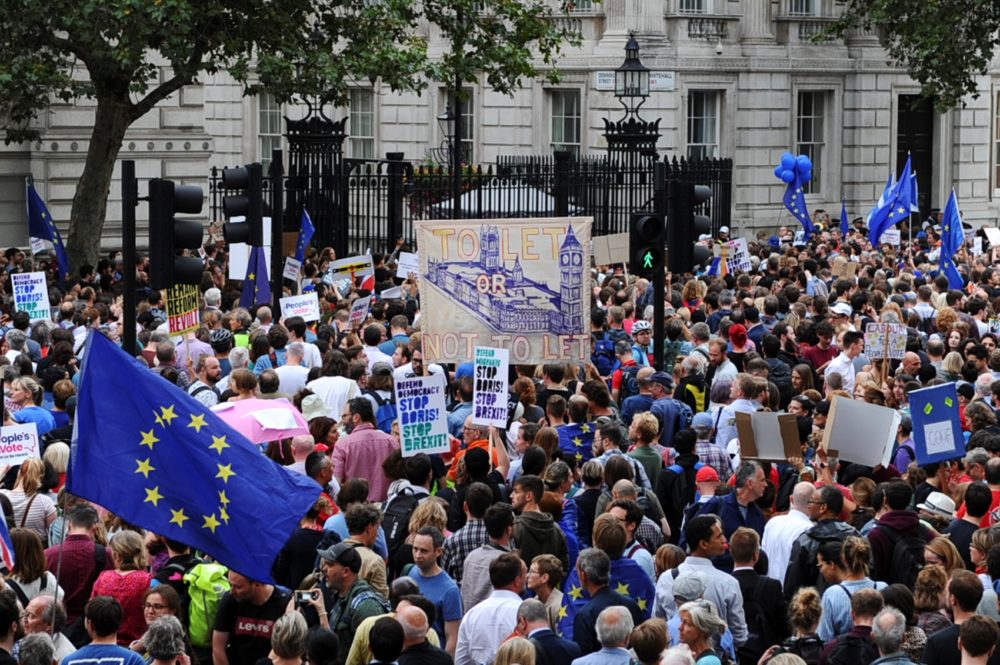Advertisement
U.K. Prime Minister Boris Johnson Sets Off Protests, Resignations With Parliament Suspension

With Meghna Chakrabarti
Some call it a chicanery, others a coup — we look at Brexit and U.K. Prime Minister Boris Johnson's unprecedented suspension of Parliament.
Guests
Malcolm Brabant, special correspondent for the PBS NewsHour. Former BBC national and international correspondent. (@MalcolmBrabant)
From The Reading List
BBC News: "Parliament suspension: Queen approves PM's plan" — "Parliament will be suspended just days after MPs return to work in September - and only a few weeks before the Brexit deadline.
"Boris Johnson said a Queen's Speech would take place after the suspension, on 14 October, to outline his 'very exciting agenda'.
"But it means the time MPs have to pass laws to stop a no-deal Brexit on 31 October would be cut.
"House of Commons Speaker John Bercow said it was a 'constitutional outrage'.
"The Speaker, who does not traditionally comment on political announcements, continued: 'However it is dressed up, it is blindingly obvious that the purpose of [suspending Parliament] now would be to stop [MPs] debating Brexit and performing its duty in shaping a course for the country.'
"Labour leader Jeremy Corbyn said: 'Suspending Parliament is not acceptable, it is not on. What the prime minister is doing is a smash and grab on our democracy to force through a no deal,' he said.
"He said when MPs return to the Commons next Tuesday, 'the first thing we'll do is attempt legislation to prevent what [the PM] is doing', followed by a vote of no confidence 'at some point'."
Advertisement
The Atlantic: "What Boris Johnson Did to the World’s Most Stable Democracy" — "Over the past months, the big question I’ve heard asked about Boris Johnson, the new prime minister of the United Kingdom, is whether it’s right to characterize him as an authoritarian populist in the mold of America’s Donald Trump or Italy’s Matteo Salvini.
"Like Trump and Salvini, Johnson makes simplistic promises, encourages a cult of personality, and loves to lambaste the elite (despite being very much a part of it). Unlike them, he cultivates a comparatively liberal image on social issues, emphasizes his love of learning, and believes that Britain stands to benefit from at least some forms of diversity and immigration.
"Each camp seemingly has evidence on its side. But if this debate seems inconclusive, that is in good part because it is based on a misunderstanding of populism. Populists can come in all kinds of ideological flavors. Many, especially in Europe, are far-right. Some, especially in Latin America, are far-left. A few, like those who belong to Italy’s Five Star Movement, claim to eschew traditional political categories. What they all have in common is an opposition to the pluralism that is inherent to any functioning representative democracy: By claiming that they, and they alone, stand for the people, populist leaders around the world delegitimize any institution that might provide a check on their power. This is why populists so often turn against long-standing democratic traditions."
The Guardian: "Boris Johnson faces third legal battle over prorogation" — "Boris Johnson is facing a third legal case to try to block the suspension of parliament after the high court in Belfast held an urgent hearing for an injunction against the prime minister.
"The case follows similar legal battles launched in Scotland and England by the SNP justice spokeswoman, Joanna Cherry, and the campaigner Gina Miller.
"The Northern Ireland case is being brought by Raymond McCord, a victims’ rights campaigner who has argued that no deal is a breach of the Good Friday agreement.
" 'We are seeking an urgent injunction to compel Johnson to reverse his advice to the queen to prorogue parliament,' said McCord’s lawyer, Ciaran O’Hare, after the 20-minute hearing on Thursday morning.
"The lord chief justice broke his summer holiday to hear the prima facie arguments.
"He instructed the applicant and the government’s defence barrister to return on Friday at 10am with expanded legal arguments for a full hearing."
Stefano Kotsonis produced this segment for broadcast.
This segment aired on August 29, 2019.